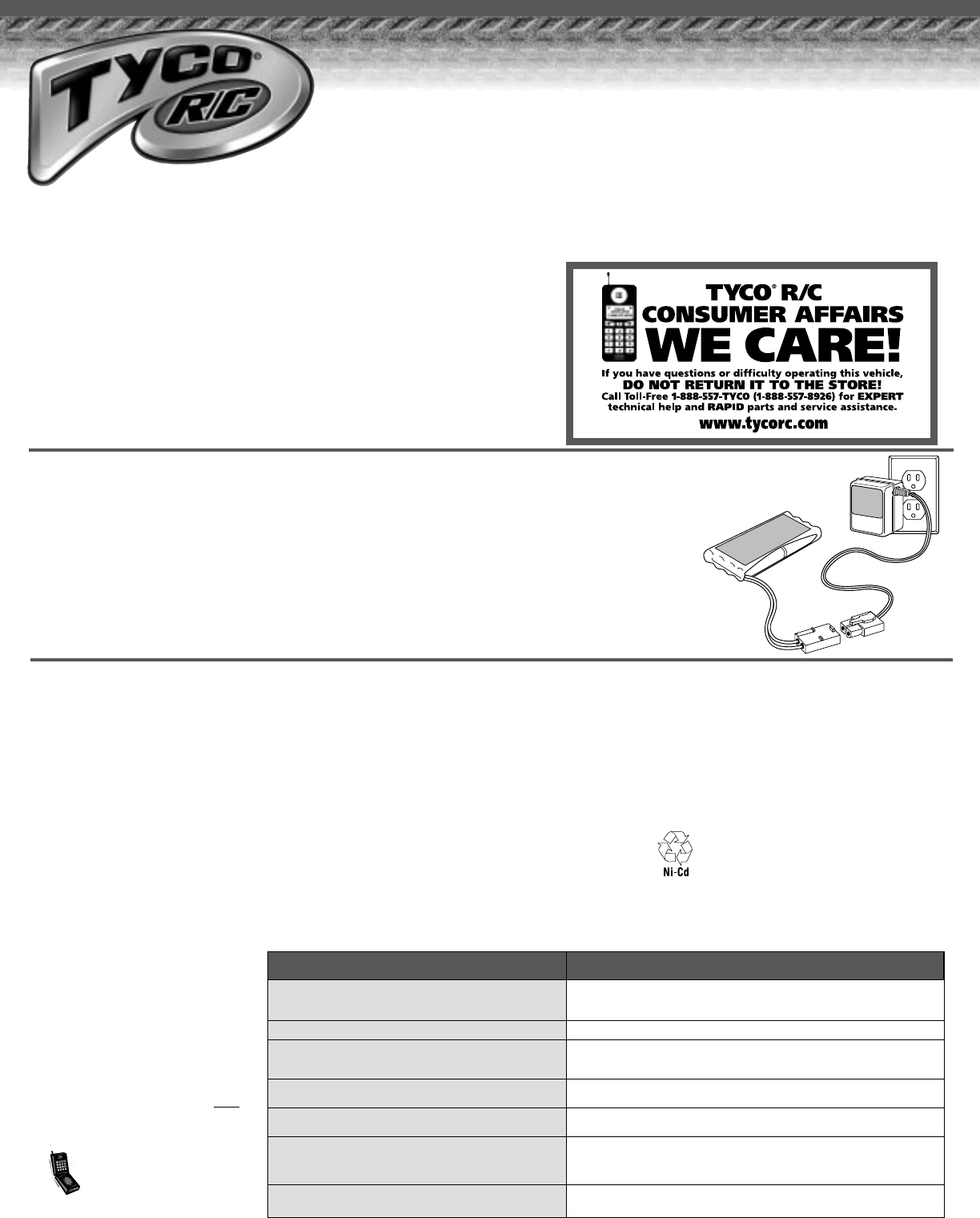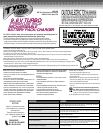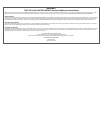
TO CHARGE THE 9.6V TURBO
®
BATTERY PACK, PLEASE FOLLOW THESE INSTRUCTIONS:
1. Plug wall pack charger into standard wall outlet.
2. Connect the wires leading from the battery pack to the wall pack charger connector. Make certain the two connectors are tightly snapped together.
3. To disconnect wires, push down on the connector clip and pull apart.
4. Your battery pack consists of new parts and materials; therefore, you should charge the battery pack for 5
1
/2 hours the first two times you charge the battery.
Subsequent charges will require only 4 hours.
5. After charging for 4 hours, the battery will feel warm. This condition is normal for fully charged batteries.
6. Charging the battery pack for more than 4 hours will not give you a longer running time. 4 hours is all that is required for a fully charged battery pack.
7. Unlike alkaline batteries, where the power loss is gradual, a NiCd (Nickel-Cadmium) battery will run for its normal running time, depending on your particular vehicle,
and then lose most of its power at once. It is time to recharge the battery pack.
8. After use, the battery pack will be hot! Wait at least 20 minutes until the battery pack cools before recharging. Recharging a warm or hot battery pack will greatly reduce the
number of times your battery pack can be recharged.
IMPORTANT BATTERY INFORMATION
• INSURE THAT BATTERY POLARITY IS CORRECT.
• USE ONLY BATTERIES OF THE TYPE RECOMMENDED (OR
EQUIVALENT).
• DO NOT MIX OLD AND NEW BATTERIES.
• DO NOT MIX ALKALINE, STANDARD (CARBON-ZINC), OR
RECHARGEABLE (NICKEL-CADMIUM) BATTERIES.
• REMOVE USED-UP BATTERIES IMMEDIATELY. REMOVE BAT-
TERIES IF VEHICLE WILL NOT BE USED FOR A LONG PERIOD.
• FOR BEST PERFORMANCE USE ALKALINE BATTERIES
(WHERE DISPOSABLE BATTERIES ARE CALLED FOR).
BATTERY LIFE MAY VARY DEPENDING ON BATTERY BRAND.
• DO NOT RECHARGE NON-RECHARGEABLE BATTERIES.
• DO NOT SHORT-CIRCUIT TERMINALS.
• REMOVE RECHARGEABLE BATTERIES BEFORE RECHARGING.
RECHARGE BATTERIES ONLY UNDER ADULT SUPERVISION.
• DISPOSE OF BATTERIES SAFELY.
CAUTIONS:
•
DO NOT RECHARGE BATTERY PACK IF IT’S HOT. ALLOW IT TO COOL
BEFORE RECHARGING.
•
DO NOT CHARGE A BATTERY PACK THAT SHOWS LEAKAGE OR
CORROSION.
•
DO NOT DISASSEMBLE THE BATTERY PACK. THE BATTERY PACK IS
A SEALED NiCd (NICKEL-CADMIUM) BATTERY.
•
DO NOT DISPOSE OF THE BATTERY PACK IN FIRE.
•
EXERCISE CAUTION IN HANDLING A HOT BATTERY PACK.
•
IF BATTERY PACK AND/OR CHARGER ARE WET,
THOROUGHLY DRY BEFORE CHARGING.
SPECIAL NOTE TO ADULTS:
•
This product is age-graded for ages 8 and over;
it should be operated in the presence of children under age 8 only
with adult supervision.
•
Regularly examine for damage to the plug, enclosure and other parts.
In the event of any damage, the toy must not be used with the trans-
former until the damage has been repaired.
•
This toy is not intended for children under 3 years old. The transformer
is not a toy.
This vehicle uses a Nickel-Cadmium rechargeable battery
pack. Must be recycled or disposed of properly. NOTE: If you
have any questions about proper disposal of Nickel-Cadmium
batteries, contact your local county office of solid waste management
(or other appropriate local office) for information.
The TYCO
®
R/C 9.6V Turbo
®
power system gives you economical and reliable power for
speed, stunts and all-around performance. Here are a few tips and hints:
•
The 9.6.V Turbo Battery Pack and Charger will work with all 9.6.V NiCd-powered R/C vehicles.
•
Your vehicle’s running time will vary depending on its power consumption (and your driving style).
A high-performance vehicle driven at full speed, with frequent turns and stunts, will give the shortest running
time between charges. For maximum performance, please read all operating instructions before operating.
Keep these instructions for future reference; they contain important information.
32997-0920
32997 (9.6V Turbo® Battery Pack & Charger)
32998 (9.6V Turbo® Battery Pack)
NOT RECOMMENDED
FOR CHILDREN UNDER
8 YEARS OF AGE. AS WITH ALL ELECTRIC PRODUCTS,PRECAUTIONS SHOULD BE
OBSERVED DURING HANDLING AND USE TO PREVENT ELECTRIC SHOCK.
INPUT: 120VAC, 0.10VDC 60Hz, ONLY. OUTPUT: 11.5VDC, 1.05VA
CAUTION-ELECTRIC TOY:
9.6V TURBO
PREMIUM NiCd
RECHARGEABLE
BATTERY PACK/CHARGER
9.6V TURBO
PREMIUM NiCd
RECHARGEABLE
BATTERY PACK/CHARGER
FREQUENTLY ASKED
QUESTIONS
Here are our answers to some
of the questions our customers
ask most often.
Take a second to read them
over. Maybe the answer to your
question is here.
OTHER QUESTIONS?
CALL OUR TOLL-FREE NUMBER.
WE’LL BE GLAD TO HELP.
Can I leave my battery pack charging for longer than 4 hours?
Can I leave my charger plugged in all the time?
Can I charge my battery pack for less than 4 hours if I don’t
need the full running time?
Can I recharge my battery pack before it’s fully discharged?
How will I know if my battery pack is “wearing out?”
How long will a fully-charged battery pack hold its charge if
I’m not actually using it?
If I’m going to store my battery pack for a long time, should I
put it away charged or discharged?
QUESTIONS? ANSWERS!
Although 4 hours is all you need for a full charge, leaving the battery pack charging
for a brief additional period will do no harm. However, “overcharging” the battery
pack on a regular basis will decrease battery pack life.
Just as a matter of basic electrical safety, we don’t recommend this practice.
Although you can do this occasionally without harm to the battery pack, we don’t
recommend it as a routine practice. To cut down on waiting time, you might want
to buy and charge an extra battery pack.
We discourage this practice. Although it poses no safety hazard, it may significant-
ly reduce battery pack life.
After many, many uses, the battery pack’s average running time will start to
decrease: it’s nearing the end of its life.
At room temperature, the battery pack will hold a charge for a good while; at
warmer temperatures, it will discharge more quickly. For gift giving, you can cer-
tainly charge your battery pack a day or so beforehand and wrap the battery pack
and vehicle together. That way the fun can start right away!
From the standpoint of electrical safety, we recommend storing the battery pack in
a discharged condition.




